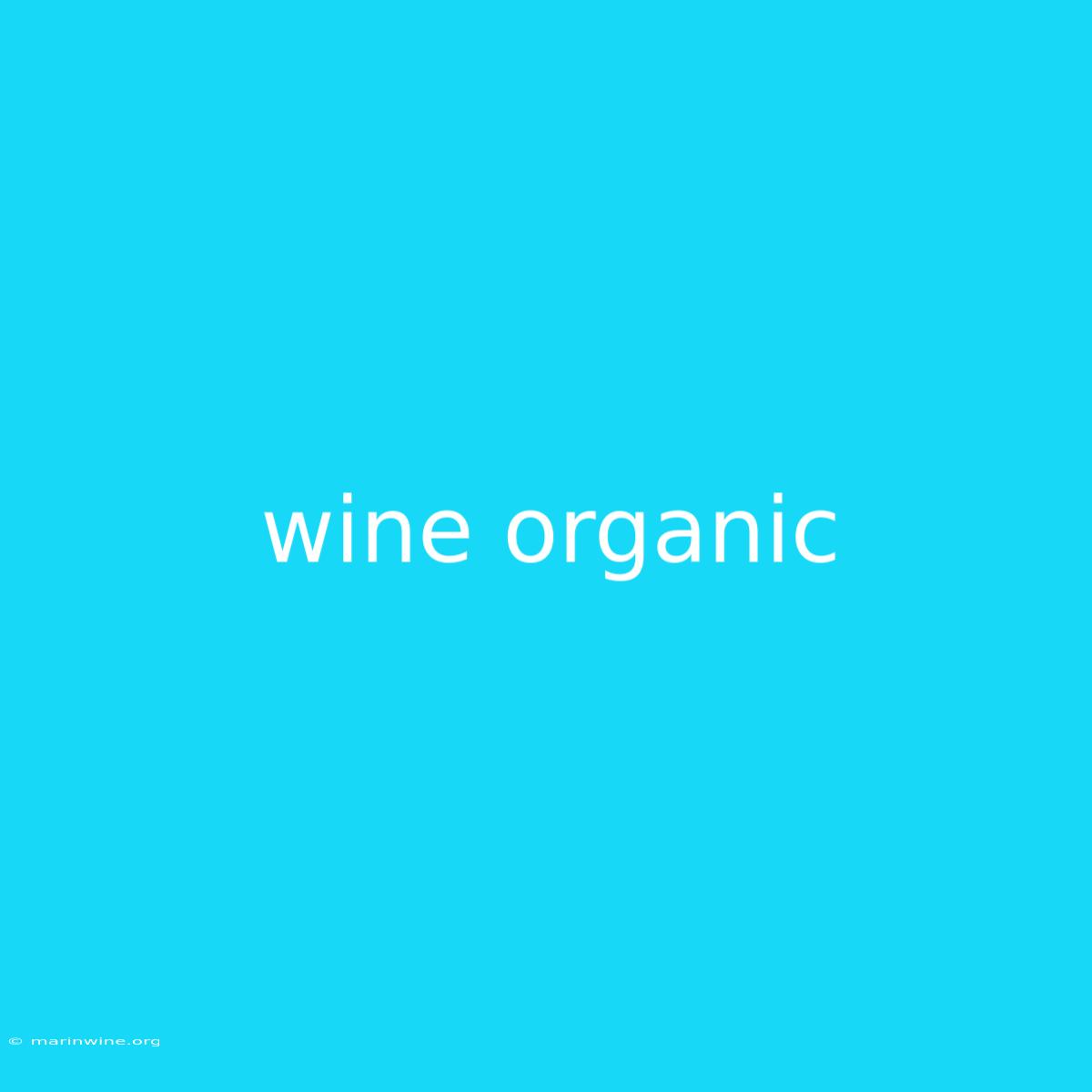The Alluring World of Organic Wine: A Sip of Sustainability
Have you ever wondered what makes wine organic? It's more than just a trendy label; it's a commitment to a sustainable approach to viticulture, prioritizing natural practices and minimizing environmental impact.
Why It Matters: Organic wine is gaining popularity for its commitment to environmental protection and its potential for producing wines with a unique flavor profile. This article delves into the fascinating world of organic wine, exploring its key aspects and why it's becoming an increasingly sought-after choice for discerning drinkers.
Key Takeaways of Organic Wine:
| Key Takeaway | Description |
|---|---|
| Sustainable Practices | Organic viticulture adheres to strict regulations regarding soil management, pest control, and vineyard maintenance. |
| Natural Flavor Profile | Organic wines often exhibit a more vibrant fruit expression, due to the absence of synthetic pesticides and herbicides. |
| Environmental Protection | Organic winemaking supports biodiversity, reduces pollution, and promotes healthy soil ecosystems. |
| Growing Demand | Consumers are increasingly seeking wines made with sustainable practices, driving growth in the organic wine market. |
Organic Wine: A Closer Look
The Essence of Organic Viticulture
Organic winemaking begins in the vineyard, where farmers prioritize natural methods for managing the vines and protecting the environment. This includes:
- Soil Health: Organic viticulture emphasizes soil health through composting, cover cropping, and avoiding synthetic fertilizers.
- Pest Control: Organic farmers utilize natural pest control methods like beneficial insects, pheromone traps, and copper sprays instead of synthetic pesticides.
- Herbicides: Organic vineyards prohibit the use of synthetic herbicides, relying on hand weeding, mulching, and other natural methods for weed control.
Unveiling the Flavor Profile of Organic Wine
Organic wines are often praised for their distinctive flavor profiles. While the taste can vary depending on grape variety, region, and specific winemaking techniques, organic wines often exhibit:
- Intense Fruitiness: Organic viticulture's focus on healthy soil and minimal intervention allows for more vibrant fruit expression in the final wine.
- Balanced Complexity: Organic wines often showcase a greater balance between acidity, tannins, and fruit, resulting in a more complex flavor profile.
- Unique Terroir Expression: The absence of synthetic chemicals allows for a clearer expression of the vineyard's terroir, the unique characteristics of the soil, climate, and environment.
The Environmental Impact of Organic Wine
Organic winemaking contributes to a more sustainable agricultural system with a positive impact on the environment:
- Biodiversity Support: Organic practices help preserve biodiversity by fostering a healthy ecosystem in and around the vineyard.
- Reduced Pollution: The absence of synthetic chemicals minimizes water and soil pollution, protecting aquatic life and human health.
- Soil Health Preservation: Organic viticulture promotes healthy soil structure, which improves water retention and nutrient availability.
The Connection between "Soil Health" and "Organic Wine"
Soil health plays a pivotal role in organic winemaking. Healthy soil acts as a foundation for thriving vines and contributes directly to the quality and flavor of the final wine.
Facets of Soil Health in Organic Winemaking:
- Nutrient Richness: Organic farming practices build soil fertility through composting and cover cropping, providing essential nutrients for vine growth.
- Biological Activity: Organic vineyards encourage a diverse population of beneficial microorganisms, contributing to nutrient cycling and disease suppression.
- Water Retention: Healthy soil structure improves water infiltration and retention, ensuring adequate moisture for the vines throughout the growing season.
The absence of synthetic fertilizers and pesticides in organic winemaking preserves the delicate balance of soil microorganisms, leading to healthier vines and ultimately, a more flavorful and nuanced wine.
Organic Wine: Addressing Concerns and Challenges
While organic winemaking offers numerous benefits, certain challenges and concerns exist:
- Cost: Organic winemaking often involves higher production costs due to reliance on labor-intensive practices and organic inputs.
- Yield Variations: Organic vineyards may experience fluctuations in yield due to the reliance on natural pest control methods.
- Organic Certification: Obtaining organic certification requires rigorous inspections and adherence to strict regulations, potentially adding complexity for winemakers.
Despite these challenges, the growing demand for organic wine and its positive environmental impact are driving progress in the industry.
FAQ for Organic Wine
Q: Is organic wine truly healthier than conventional wine?
A: While organic wine does not contain synthetic pesticides and herbicides, its health benefits compared to conventional wine are not definitively proven.
Q: How can I tell if a wine is truly organic?
**A: ** Look for reputable certifications like "USDA Organic" or "EU Organic" on the label.
Q: What are some popular organic wine regions or producers?
A: Some notable organic wine regions include:
- France: Loire Valley, Bordeaux, Burgundy
- Italy: Tuscany, Piedmont
- Spain: Rioja, Ribera del Duero
- United States: California, Oregon, Washington
Q: Where can I find organic wine?
A: Organic wine is increasingly available in retail stores, online marketplaces, and specialty wine shops.
Tips for Choosing and Enjoying Organic Wine
- Read the Label: Look for certifications like "USDA Organic" or "EU Organic" to ensure authenticity.
- Explore Regions and Producers: Discover new organic wine regions and producers to broaden your palate.
- Pairings: Organic wines can pair beautifully with a wide range of foods, so experiment with different combinations.
- Support Sustainable Practices: Choosing organic wine helps support sustainable agriculture and environmental protection.
Summary of Organic Wine
This article has explored the fascinating world of organic wine, emphasizing its commitment to sustainable viticulture, unique flavor profiles, and positive environmental impact. From soil health and pest control to the final bottle, organic winemaking prioritizes natural practices to produce high-quality wines with a focus on both quality and sustainability.
Closing Message: As consumers become increasingly aware of their impact on the environment, the demand for organic wine is likely to continue growing. By choosing organic wines, we can support sustainable practices and enjoy the unique flavors and characteristics they offer.

